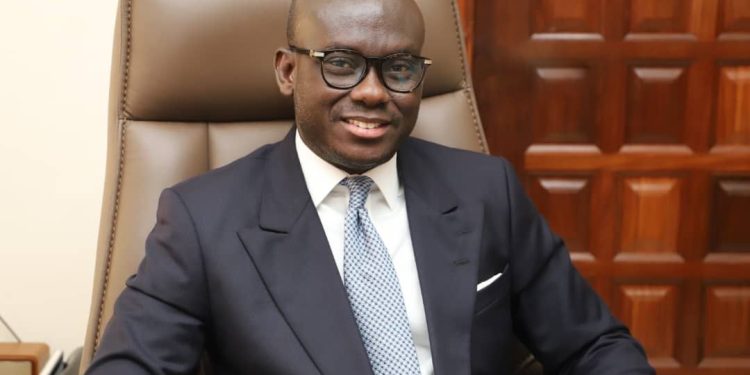Attorney General and Minister of Justice, Godfred Yeboah Dame, has supported the Supreme Court's decision to defer its ruling on an interlocutory injunction application filed by Richard Dela Sky and Dr Amanda Odoi, seeking to prevent Parliament from transmitting the anti-gay bill to the presidency for assent.
Speaking to the media after the ruling, Mr Dame said, "I think the court is fair in coming by that approach".
"The court has still not disposed of the application for the interlocutory injunction. The court said the determination of that application for that interlocutory injunction should abide by the determination of the main case and for that matter, it is reserving its determination until the main action is heard. It tells you that the application for interlocutory injunction is still pending," he told journalists after the hearing.
On the back of this, Mr Dame believes "that will be the proper course to take" adding that he is preparing to file his processes as a matter of compliance.
The 5-member Supreme panel chaired by the Chief Justice in deferring its ruling on Wednesday, July 17, indicated that it will give the decision in the injunction application and the substantive application together in an expedited trial.
The panel, at the application hearing stage, comprised Justice Mariama Owusu, Justice Prof Henrietta Mensa-Bonsu, Justice Ernest Gaewu, and Justice Yaw Darko Asare.
The two lawsuits filed by Broadcast Journalist, Richard Dela Sky, and Researcher, Dr Amanda Odoi are against Parliament’s passage of the controversial anti-gay bill.
In the first case titled Dr Amanda Odoi vs. the Speaker and Attorney General, Lawyer for the applicant Ernest Arko, argued that both the Speaker and the Clerk to Parliament should be restrained by the Apex Court until after the determination of the substantive matter.
He contended that irreparable damage and harm would be inflicted on the applicant if the interlocutory injunction is not granted, while the Speaker would not suffer if it is refused.
The Plaintiff, who is seeking the apex court to declare the bill null and void, also argues that the passage of the bill violates provisions of the 1992 Constitution particularly Article 33(5) as well as Articles 12(1) and (2), 15(1), 17(1) and (2), 18(2), and 21(1) (a) (b) (d) and (e).
Attorney General Godfred Yeboah Dame indicated that the bill should not have been entertained in Parliament in the first place.
His contention was that it was in violation of Article 108 of the 1992 constitution which states that Parliament shall not, unless the bill is introduced or the motion is introduced by, or on behalf of, the President: proceed upon a bill, including an amendment to a bill, that, in the opinion of the person presiding, makes provision for any of the following; the imposition of taxation or the alteration of taxation otherwise than by reduction; the imposition of a charge on the Consolidated Fund or other public funds of Ghana or the alteration of any such charge otherwise than by reduction; or the payment, issue, or withdrawal from the Consolidated Fund or other public funds of Ghana of any money not charged on the Consolidated Fund or any increase in the amount of that payment, issue, or withdrawal.
He opined that, “what the (Supreme) Court ought to look at in granting an application for interlocutory injunction is whether substantial questions of law have been raised by the plaintiff.” To him, the conditions precedent for entertaining the bill in parliament was not met, and anything done about the bill should be declared a nullity.
In opposing the application, lawyer for the Speaker, Thaddeus Sory, argued that no violation would be inflicted on the applicant if the request is refused. He said the application is a repetition of what had been put before the court earlier by the applicant, and the court should not place any weight on such an application. He contends that process hasn’t ended, and thus injuncting parliament from transmitting the bill to parliament would be usurping the powers of the legislature.
In the case of broadcaster and lawyer, Richard Dela Sky, his counsel, Paa Kwesi Abaidoo, pointed to the absence of fiscal impact analysis, which formed the basis for the passage of the bill.
Among the reliefs sought in Richard Sky’s writ is an order to restrain the Speaker of Parliament and the Clerk to Parliament from presenting The Human and Sexual Values Bill, 2024, to the President for his assent.
The plaintiff is also seeking an order to restrain the President from assenting to The Human and Sexual Values Bill, 2024, arguing that such action would directly contravene the constitutional safeguards protecting the liberties and rights of Ghanaians.
Attorney General Godfred Yeboah Dame argued that the bill ought to be stayed until the final determination of the substantive suit.
Latest Stories
-
Amazon faces US strike threat ahead of Christmas
25 minutes -
Jaguar Land Rover electric car whistleblower sacked
32 minutes -
US makes third interest rate cut despite inflation risk
37 minutes -
Fish processors call for intervention against illegal trawling activities
49 minutes -
Ghana will take time to recover – Akorfa Edjeani
1 hour -
Boakye Agyarko urges reforms to revitalise NPP after election defeat
2 hours -
Finance Minister skips mini-budget presentation for third time
2 hours -
‘ORAL’ team to work gratis – Ablakwa
2 hours -
Affirmative Action Coalition condemns lack of gender quotas in Transition, anti-corruption teams
2 hours -
December 7 election was a battle for the ‘soul of Ghana’ against NPP – Fifi Kwetey
2 hours -
Social media buzzing ahead of Black Sherif’s ‘Zaama Disco’ on December 21
2 hours -
Afenyo-Markin still suffering from the massive defeat – Fifi Kwetey
2 hours -
Retain Afenyo-Markin as NPP leader, he has experience – Deputy Speaker
3 hours -
Kufuor didn’t leave behind a strong economy – Fifi Kwetey
3 hours -
It won’t be business as usual, remain humble – Fifi Kwetey to party members
3 hours

